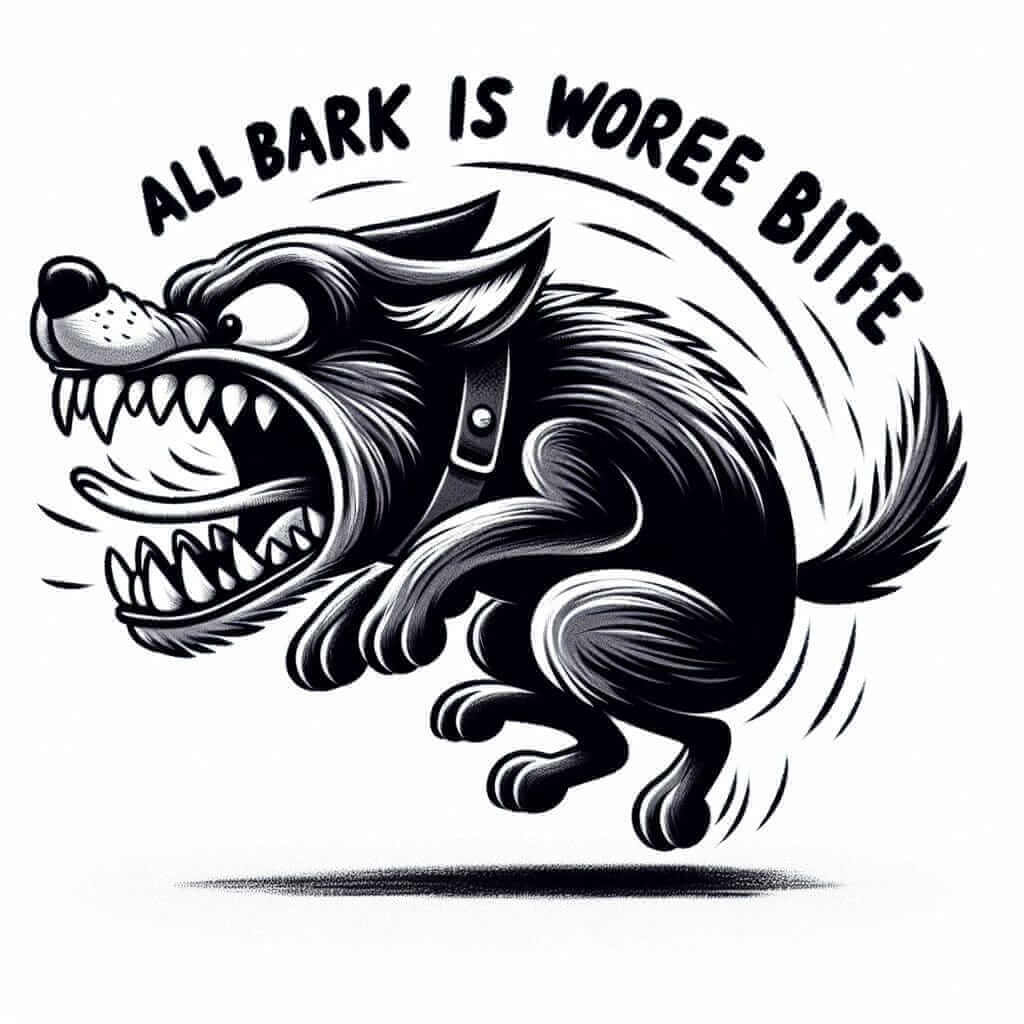When preparing for the IELTS exam, understanding idiomatic expressions and their appropriate usage can significantly boost your performance in both the Speaking and Writing sections. Today, we will deeply explore the idiom “bark is worse than the bite”—its meaning, application in different contexts, and its relevance to the IELTS exam.
What Does “Bark is Worse than the Bite” Mean?
The idiom “bark is worse than the bite” is used to describe someone who seems to be more intimidating or severe in their words than in their actions. Essentially, it signifies that a person’s words or threats are much more severe than their actual behavior.
Phonetic Pronunciation: /bɑːrk ɪz wɜːrs ðæn ðə baɪt/
Synonyms and Related Idiomatic Expressions
-
All bark and no bite (idiom – [æ̯ɫ bɑːrk ænd noʊ baɪt]): Someone who talks tough but doesn’t act tough.
- Example: Jeff is all bark and no bite; despite his harsh words, he’s very gentle.
-
Cry wolf (idiom – [kraɪ wʊlf]): To give a false alarm.
- Example: If you cry wolf too often, no one will believe you when there’s real danger.
-
Make a mountain out of a molehill (idiom – [meɪk ə ˈmaʊntɨn aʊt ʌv ə ˈmoʊlhɪl]): To exaggerate a minor problem.
- Example: Don’t make a mountain out of a molehill; it’s just a small argument.
-
Paper tiger (noun – [ˈpeɪpər ˈtaɪɡər]): Someone who seems powerful but is actually ineffectual.
- Example: The dictator was considered a paper tiger, appearing formidable but actually powerless.
-
Empty threat (noun – [ˈɛmpti θrɛt]): A threat that is not intended to be executed.
- Example: Mike’s threat to quit was an empty threat; he didn’t follow through.
Relevance in IELTS
Frequency of Idiom Use in IELTS
Idiomatic expressions like “bark is worse than the bite” can frequently appear in both the Writing and Speaking sections of the IELTS exam. Examiners may assess your ability to use these expressions correctly to convey nuanced meanings and demonstrate linguistic sophistication.
Examples from IELTS Speaking and Writing
In the Speaking section, you might be asked to describe people or situations, and using this idiom can illustrate your advanced vocabulary. In the Writing section, it might help articulate complex ideas more vividly.
Speaking Example:
Question: Describe a time when you had a disagreement with someone.
Answer: “I had a disagreement with my supervisor once. Initially, she seemed very confrontational and stern. But eventually, I realized that her bark was worse than her bite; she was actually quite reasonable and accommodating.”
Writing Example:
Topic: Discuss the role of authority in a working environment.
Example: “While some managers adopt a stringent approach, it is often the case that their bark is worse than their bite. This façade of strictness frequently masks their innate willingness to collaborate and support their team.”
Practical Examples with Detailed Analysis
-
Example Sentence: Although his tone was furious, everyone knew that his bark was worse than his bite.
- Analysis: This sentence shows a contrast between words and actions, highlighting that the person’s anger is more performative than real.
-
Example Sentence: When the new policy was announced, the employees were worried, but it turns out the manager’s bark was worse than her bite.
- Analysis: This illustrates that initial fears were exaggerated, and the actual implementation was not as severe.
-
Example Sentence: Parents often use stern warnings to discipline children, but wise kids know that their parents’ bark is usually worse than their bite.
- Analysis: Demonstrates understanding of parental discipline and the use of threats to instill good behavior.
-
Example Sentence: The media portrays him as a fierce critic, but insiders know his bark is worse than his bite.
- Analysis: Shows the difference between public perception and private reality.
-
Example Sentence: Even though she complained loudly, we quickly understood that her bark was worse than her bite.
- Analysis: Highlights the gap between vocal complaints and actual actions.

Combining with Other Words
The idiom can be used effectively with adjectives, adverbs, and other idioms:
- “initially” (adverb): Initially, his bark was worse than his bite.
- “stern” (adjective): Her stern demeanor suggested otherwise, but her bark was worse than her bite.
Idiomatic Combinations:
- “All bark and no bite”
- Example: “His threats were all bark and no bite, so nobody took them seriously.”
Related Idioms with Examples
- Cry wolf:
- “He tends to cry wolf, so no one paid attention to his warnings.”
- Make a mountain out of a molehill:
- “She always makes a mountain out of a molehill, turning small issues into big dramas.”
- Paper tiger:
- “The company is a paper tiger in the tech industry, boasting much but achieving little.”
- Empty threat:
- “His promise to leave was an empty threat; he never intended to.”
Conclusion
Understanding and using idioms like “bark is worse than the bite” can significantly enrich your language and impress IELTS examiners. Practice incorporating such expressions in your speaking and writing to convey complex ideas clearly and concisely. Additionally, explore related idioms to broaden your vocabulary and enhance your linguistic versatility.
For more tips and detailed topics about learning and using idioms in IELTS, you can visit How to Describe an Animal in IELTS.
Ensure you practice these idioms in different contexts to get comfortable and confident in their usage—an essential skill for achieving a high band score in your IELTS exam!